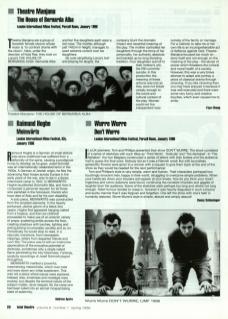Raimund Hoghe is a German of small stature who since childhood has suffered from a deformity of the spine, causing a prodigious hump to develop as he grew. Josef Schmidt was an internationally celebrated tenor in the 1930s. A German of Jewish origin, he fled the advancing Nazi troops across Europe in the early years of the war, only to die in a Swiss internment camp in 1942. In Meinwärts Hoghe recollected Schmidt's fate, and from it composed a personal requiem for all those who perished in the holocaust, friends who have died of AIDs and for his own disability.
A solo piece, Meinwärts was constructed from the simplest elements. In the heavily perfumed, uterine gloom of a black-box space, Hoghe first appeared hanging naked from a trapeze, and then (re-clothed) proceeded to make use of an eclectic variety of props: scattering lentils across the floor, creating shadows with torches, lighting and extinguishing innumerable candles, and so on. Periodically he would stop to read, in a staccato monotone, from newspaper clippings, letters from departed friends and such like. The piece was lit with an instinctive appreciation of the evocative potential of darkness, sometimes only a single naked flame penetrating the inky blackness. Faraway, scratchy recordings of Josef Schmidt played throughout.
Meinwärts instilled a powerful, mesmerising melancholia, which overrode and wore down any initial scepticism. This was not a piece where issues were explored. Instead, loss, loneliness and nostalgia were evoked, but despite the terminal nature of the subject matter, never despair. By the close one had been lulled into an almost incapacitating state of solemnity.

